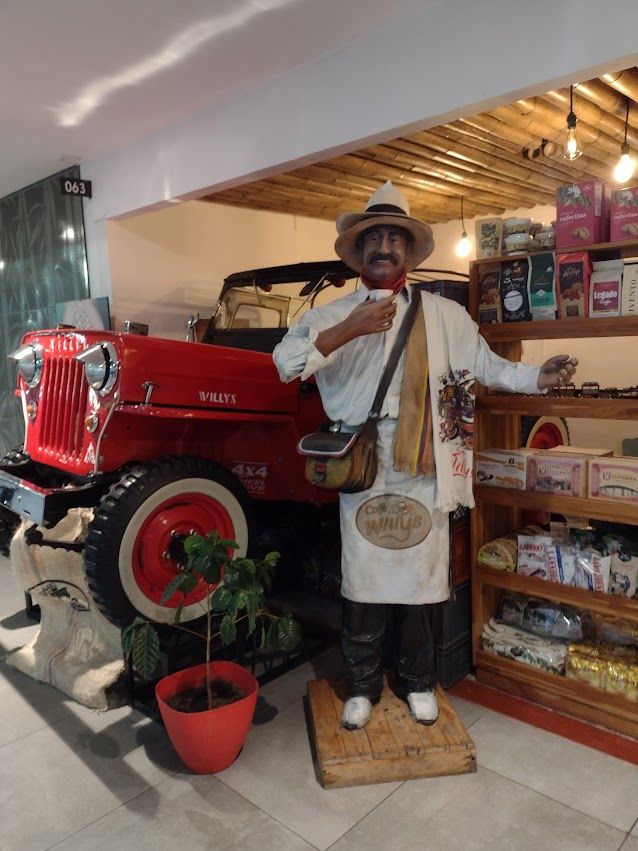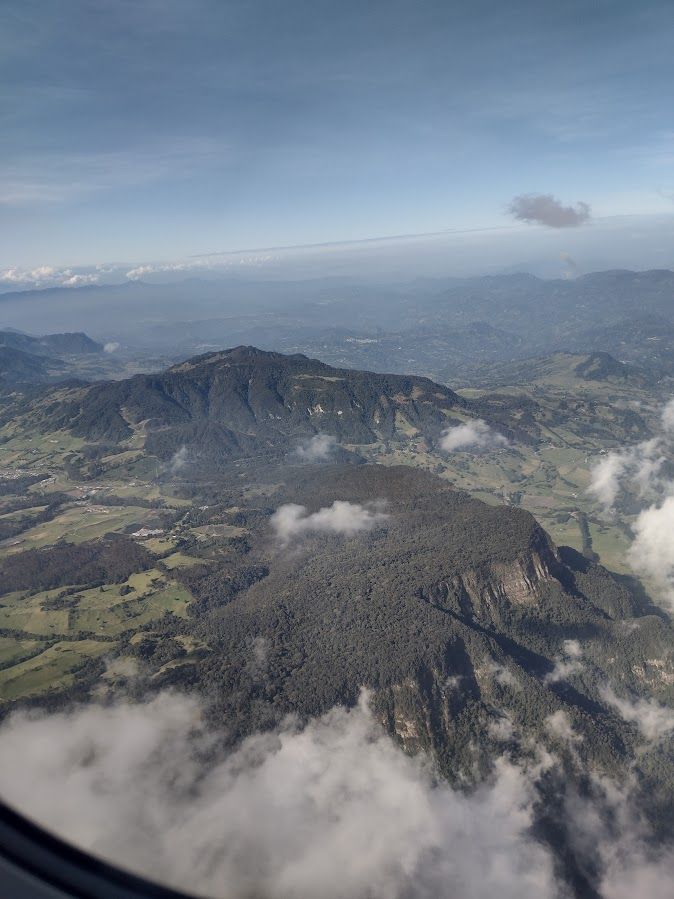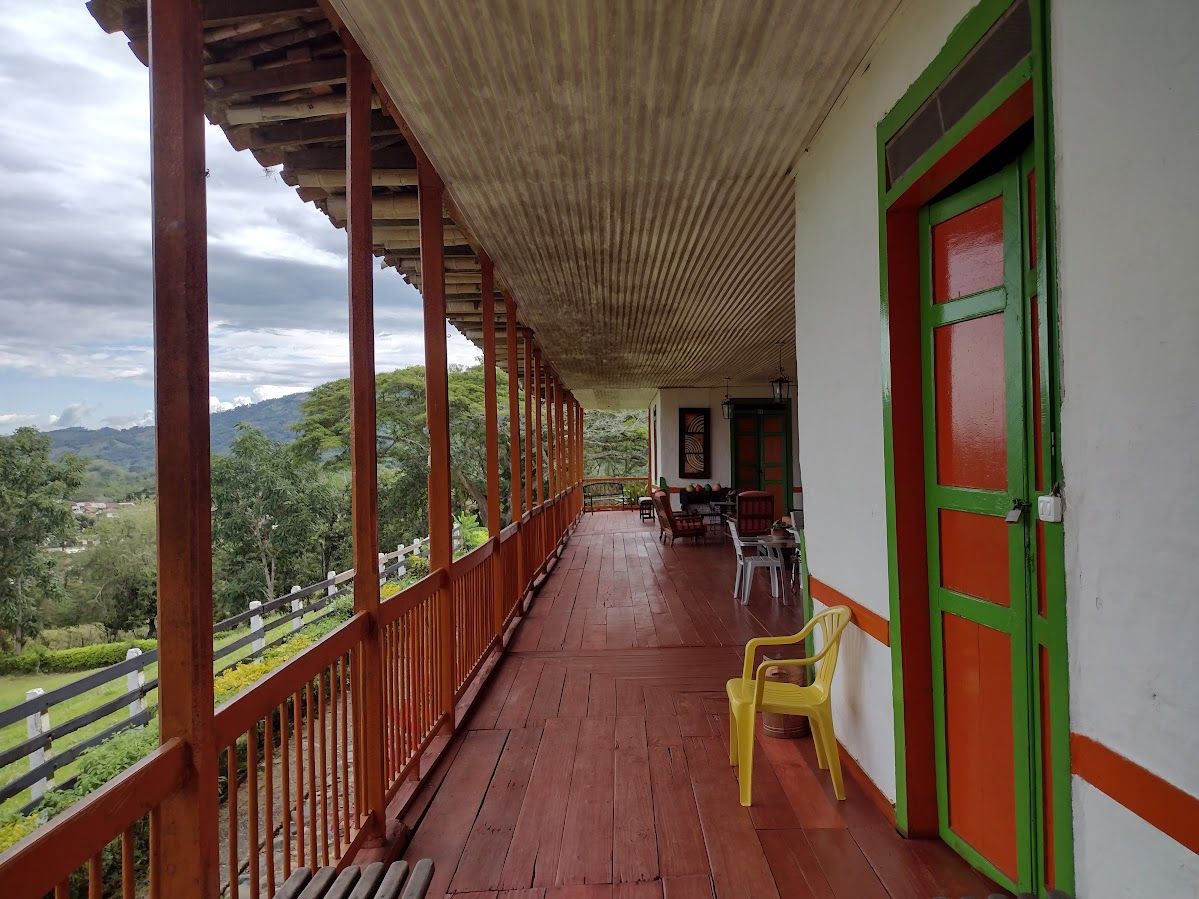
Some things I learned about becoming an expat that I didn't expect
The flight to Eugene is delayed. Of course it is. My day began in Bogota in one of those downtown, city street-facing hotels which are so damned loud that you can't possibly sleep. At least you can't if you're like me, when if a gnat sneezes I leap out of bed. So I'm gassed, and it's another two hour wait to make it back to my place, which is mine, for now, in Oregon.
Noise can be a problem in gaudy, gorgeous Colombia, especially in the cities, where parties can be long and hard. That seems to suit a lot of ex-pats. I'm not one yet but seriously working on that possibility.
I just spent two weeks exploring the Coffee Axis region of Colombia, which, if all things go as tentatively planned, I am likely to be spending part of the year. I'm currently reading a Kindle book by an ex-pat, a fellow veteran, who is extolling the virtues of retiring down there. I have some reservations, but not about the area itself. There are other issues to consider. However falling in love with the geography, the people and, well, damned near everything else isn't one of them.
My Spanish stinks, for one. However, when you are in Colombia, you'd better either have a translator with you at all times or learn to dog-paddle fast. I learned to dog-paddle. I still sound like an idiot toddler gargling molasses, but I can make myself largely understood.
Well, okay, most of the time.
Okay OKAY, some of the time.
Then someone hauls out a cell phone, turns on Google translate. Then I write something funny that sends everyone into hysterics.
Colombians love a gringo who can laugh at herself. For my part there is plenty to laugh at. All I have to do these days is look in the mirror.
There is much to love in Colombia, a country which, I am finding out, was populated and built by slaves, thanks in part to Spain and others. The United States isn't alone in that. I'm reading a history of Colombia and it's eye-popping. Any time you think you might want to live somewhere else it serves to read the history. In Colombia, Simón Bolívar was the real hero, although many more would do much to make that country a nation. Like its many active volcanoes, Colombia is still forming.
I am indeed looking for a place to land, even if it's for just a few months out of the year. Colombia is magical, and while the narcos and drug mafia still exist, the country has come a long way.

The Kindle author writes, with good cause, that his health has improved since he walks everywhere (and where he is ain't flat and it ain't sea level), his foods are all local and fresh, and he now engages in all kinds of sports all the time as he ages towards seventy.
Look. We could all use some of that. His situation is driven by the fact that cars are utterly unnecessary there, way too pricey, and you just don't need 'em.
However, Colombia is hardly the only place this is true. People who are brave enough to become ex-pats and who take the time to explore multiple countries, which is what I plan to do, find that there are still scads of places where life is slower, healthier, and the escape from the 24/7 browbeat that is the American economic system is life-renewing.

Since I've been traveling a lot anyway, this isn't that big a leap. However, selling the house- and it is now for sale (see above)- and getting rid of my stuff have made all that far more imminent. I've got a few things to attend to first, but while I do, I am perusing.
Countries, that is. And considering what kind of life to live, given that the one that I am living now is changing fast. That's terribly exciting and scary as hell but hey, I signed up for the wild ride.

Let's chat for a sec, okay? Especially if the idea of slipping far, far away is appealing to you, as it is to me?
When Covid cost many countries their tourist dollars, more than a few began drumming up new ways to make up for the deficit. Digital nomad visas, retiree visas, investor visas, all kinds of new offerings sprang up to entice those with healthy currencies to come on down. And spend, please.
And not just the uber-rich. These visas were pointed towards more middle-to- upper income folks and, of course, young travelers far from retirement.
Some countries have already discovered some of the downsides of too many Americans (ask other Americans about that) like Mexico and Panama, and are starting to tighten things up. Expect that to happen elsewhere, too, when tourists end up their neighbors. But I'm ahead of myself.
For those who were considering these options, the world opened up a great deal more during Covid. It isn't just that it suddenly became relatively easier to travel but also live overseas, some of the options made that decision downright delicious.
However, as the author writes, it ain't for everyone. As Americans, for example, we are in the habit- those of a certain age anyway-of selling the home we have, assuming we have one, and promptly buying another. Not a smart thing to do in a brand-new country, especially if we're not totally sure we want to hang out forever, because exchange rates are wobbly, at best. That's not all.
We have to learn a new language, a new culture, and we may find out that we have to give up far more conveniences and quality than we want. Fine, go home. Better that than stick around and complain bitterly, as some ex-pats do (just scan the online forums).
I mention this simply as an example because you and I can't take our expectations based on the American economy overseas, where everything from health care to real estate may well be fundamentally different.
And this is where I made a right interesting discovery.

This involves health and healthcare, and the shape we are in physically as aging Americans who want options. My lane.
Particularly as it relates to health care, those developing countries for whom it looks like such a bargain to us are not exactly feeling the same way about a good many of us.
Since I write about this a lot, and do my best to live it, it serves teasing out as those countries tease us with photoshopped photos of gorgeous beaches and pretty cities.
The rest of the world does NOT want our health care issues. Here's what I mean. While you may well- and I recommend it highly as I've done it- choose medical tourism for a procedure which will cost you vastly less in Thailand or India by doctors easily as good or better than our own, when it comes to moving elsewhere just to get cheap healthcare, those doors are starting to close.
At least they are getting a lot harder to slip through, if you get my meaning.
Colombia, for example, will consider you and me for a retiree visa, but we have to get health insurance. While I've read confusing and differing accounts about what's required (ask different people you get different answers, including trying to find a single source online). The cost of that health insurance can vary. For those who have severe health issues it's likely to be a lot more expensive. Do you really think that the medical system in Colombia or elsewhere wants to inherit boatload after boatload of seriously ill, horribly obese people who will strain their limited resources?
It's not really much different from a life insurance company which wants to give you a rigorous overview before they insure you for mega bucks. Insurance companies want to insure healthy people, which has ever been the case, as they want premiums. They don't want to have to pay on them.
They don't have much intention of opening their doors to that kind of burden, and I don't blame them one bit. If you had a country full of healthy people, for whom the average cost of health care is low because they exercise, don't tend to eat junk food and are a lot happier than we are, why on earth would you open the floodgates to us Americans?

You see my point.
I also learned that Colombia has become particularly careful about veterans, who may have PTSD, and if so, may become more than just a health risk. Colombia and other countries where health care is a lot cheaper frankly, don't want us if we're bringing our awful health issues with us, issues which are largely driven by bad habits and poor choices.
Colombia is poor, but she is a giving country. We Americans are welcome if we add value. If we only come to be parasitic, we don't deserve to live in paradise.
You'd feel precisely the same way if you were considering visa options for folks. What good is a couple retiring in Colombia if they keep their money off shore and cost the healthcare system a fortune? We'd simply be sucking their resources dry.
How very, very colonial that is.
This reminds me a great deal of an exchange I had with a few folks over on Medium about late-in-life dating. Several folks wrote about dates with the opposite sex, male or female, people who looked great on paper but who were, in fact, in search of a caretaker. They were in poor physical condition and were desperate for help, and thought that marrying someone would fix the problem.
Nope. Fixing our bad habits earlier in life goes a very long way towards fixing that issue.
In effect, some parts of the rest of world, having watched us for a very long time and having learned their lessons, are starting to draw some boundaries. If we want to move where the health care is cheaper, in effect, we need to make sure that our own health is more in line with the locals.
Or we may find when we move that their health insurance premiums better reflect the cost and risk burden our collective poor health places on all of us over here.
I kinda like that message. I sure respect it.
Consider this: many of the hotels where I stayed had toilets designed for the locals. A great many of us couldn't even squeeze into it, much less utilize the facilities. There is no ADA or OSHA overseas agitating for businesses to accommodate disabilities or our significant girth.
Certain countries, whose healthcare systems are based on a far more healthy, happy population, are not particularly eager to welcome us in as residents if we bring typical American health issues with us and expect that host country to foot the bill.
It's bad enough that American corporations are importing our awful food and drink (KFC, and Coke, for example) which sicken their populations the way they have done to us. Good people in those countries want that part of American culture gone for good reason.
We Americans no longer are the best economy, we no longer are in first place, and we most assuredly no longer command the kind of respect and regard in the world that we knew when I first joined the military.
The rest of world is no longer so eager for American dollars that they will undermine their economy, their health and the beauty of their landscape to get them.
So if you're thinking of going somewhere else to live, it's something to keep in mind. We may or may not be welcomed as residents and retirees. Part of that policy may well be determined by the kind of shape we're in both financially AND physically.
Another message, perhaps, that it's time to tighten things up not only for ourselves but also to best ensure options we may want as we age. It is never ever ever EVER too late, as many of my readers have shared with me.
Let's locate our socks, shoes and start... walking, hiking, eating better, whatever.
Because if you get the bug like I did about Colombia, I want you to be able to pass whatever health standards that country may have, and live the life you want.

Comments powered by Talkyard.